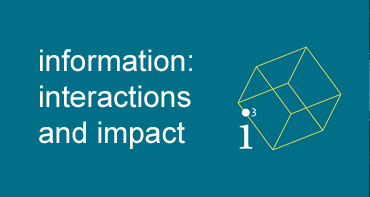 I’ve been informed, interacted and impacted at i3! I could only attend on Thursday and this morning, but my eyes have been opened to the wide world of Library and Information Research, and some of the characters in this world.
I’ve been informed, interacted and impacted at i3! I could only attend on Thursday and this morning, but my eyes have been opened to the wide world of Library and Information Research, and some of the characters in this world.
The sessions I attended were
 (Because my blood-sugar crashed, I didn’t get to attend the final plenary except to see colleagues Iris Buunk and Hazel Hall win the prize draw.)
(Because my blood-sugar crashed, I didn’t get to attend the final plenary except to see colleagues Iris Buunk and Hazel Hall win the prize draw.)
I mentioned the social aspects because I think some of the most interesting stories around research came out then. For me, and of course I may be wrong, papers deliver the ‘facts’, conference presentations tell some of the ‘back-story’, and social events can fill in the details. For example, a researcher talked about the major difficulties she experienced when trying to travel to collect data. So now I’m a bit more fore-warned of some possible practical difficulties.
I won’t say which I thought was the best presentation, because that would imply there was a ‘worst’. As far as I’m concerned, anyone who exposes their ‘research-hearts’ to a sea of potential criticism is a winner.

Drs Bhuva Narayan and Bruce Ryan
But I will say which I got the most out of personally: Bhuva Narayan’s presentation on information avoidance amongst diabetics described my personal world. A research blog isn’t the place to rant about my personal experiences of this condition, much as I want to. But I think it is appropriate to note how our careers have included academic/educational publishing before moving into academic research which is close to our respective hearts.
I’m also tempted to wonder whether there is room for research into information misbehaviour, e.g. are there links between information avoidance and other ‘undesirable’ activities?
My other favourite was Graeme Baxter’s presentation on post-truth politics and Scottish citizens’ information behaviour. Graeme showed how people reacted to political statements made by the five major Scottish political parties. Each party published statements intended to advance their positions and/or denigrate other parties, by quoting ‘facts’ without citing references. In fact, Graeme and colleagues had to dig quite deeply to establish sources and hence the veracity of the ‘facts’ they ‘tested’ on their participants.
As a scientist, it’s hopefully second nature to back up facts and statements with either citations showing where these were ‘proved’, or to prove them ourselves from the data we’re presenting – anything else is plagiarism or worse. Not so in political campaigning, it appears. Graeme suggested that political ‘facts’ go on a journey in which ‘original sources become less clear and facts become increasingly reinterpreted’. I guess the moral is an undertone of ‘facts matter’, in that we need to be sure that our facts are facts (i.e. true/correct), and the contexts in which they are they are true, and what they really mean.
For example, Graeme showed a political communication saying that 152,000 college places had been lost. Did that mean that 152,000 people were now being denied the chance of a full degree, thus potentially harming Scotland’s economy and much else? Er, no, it meant that quite a number of short courses and lessons in mostly ‘hobby’ interests were being cut. For me, any loss of educational opportunities isn’t great, but this ‘fact’ wasn’t anywhere near as bad as it appeared. I’d be disappointed if I couldn’t go to an interesting one-off lecture or short course on one of my interests, but it probably wouldn’t be career- or life-threatening. And as my colleague Todd showed, there is a huge amount of educational material on YouTube, for example. (The difficulty there, as he also mentioned, is learning which material offers me the most value, and doesn’t omit the things I really need to learn.)
I’m particularly interested in two things related to Graeme’s presentation. (This doesn’t mean I’m not interested in other aspects!)
- The first is the extent to which people trust facts coming from government, rather than political parties’ campaigns. Graham cited the white paper on Scottish Independence which was delivered in 2014. Was that an output from a party or from the government or from the ‘neutral’ civil service? (I’m interested because I know a few current and former civil servants who sweated blood to try to ensure that it contained established facts, and clearly differentiated between these and ambitions for the post-independence world. But civil servants are required to serve the government of the day, even if this goes agains their personal views, unless this would involve them in something seriously immoral.)
- The second is how much people trust information provided by community councils. (Let’s ignore how little people appear to actually access this information. As my colleague Peter Cruickshank points out, it’s entirely possible to take in and act on such information without leaving any obvious signs of engaging with it.) I’d really like to understand what people make of the (digital) information outputs of their community councils. I hope we can soon do some engagement research that probes this.
Final thoughts
Firstly, I’m inspired to do a bit of object-oriented programming around a model cool cat, especially as I’m cited for some reason.
Secondly, I’m sorry I couldn’t attend all the presentations made by my Napier colleagues.
Finally, a huge thank-you to i3 organisers Dr Elizabeth Tait and Professor Peter Reid for organising a great conference. Here’s looking forward to i3 2019!








